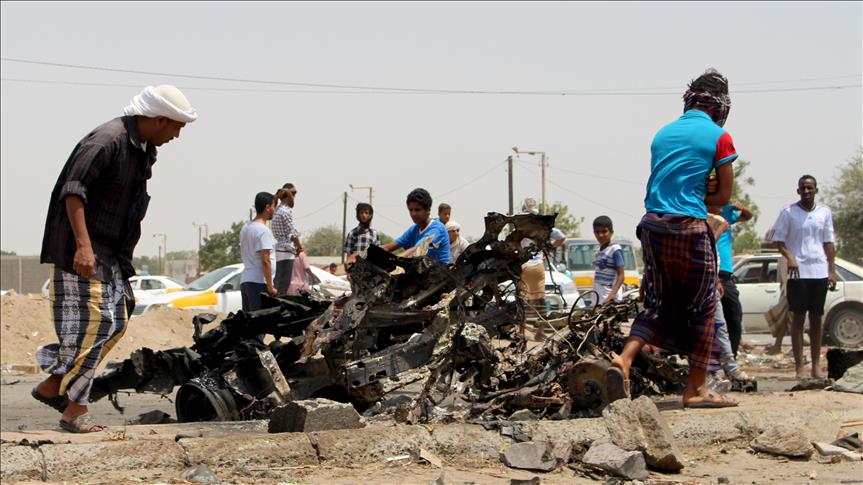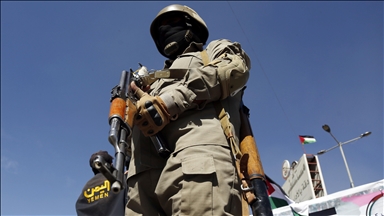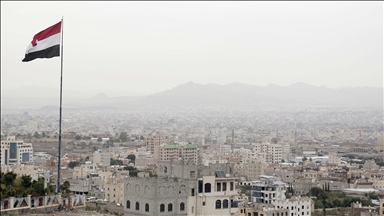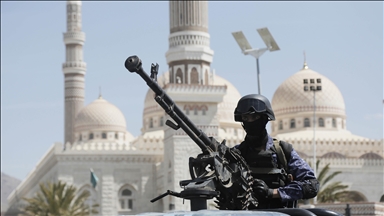Yemenis disheartened by suspension of peace talks
Talks in Kuwait postponed to July 15, dashing Yemenis’ hopes for speedy resolution of conflict

Yemen
By Zakaria al-Kamali
SANAA
UN envoy to Yemen Ismail Ould Cheikh Ahmed has announced the temporary "suspension" of peace talks in Kuwait, dashing Yemenis’ hopes for a speedy resolution of the conflict in their war-weary country.
In a Wednesday statement, Ould Cheikh said the two warring parties -- Yemen’s internationally-recognized government and the Shia Houthi group -- would return to the negotiating table on July 15 with "practical recommendations" for hammering out a final agreement.
During the two-week hiatus, the envoy added, a "series of meetings would be held between Yemeni and regional leaders" with a view to expediting the negotiating process.
Sources close to the talks told Anadolu Agency that the meetings’ agendas would include proposals for a ceasefire extension and prisoner exchanges.
UN-backed peace talks in Kuwait -- between Yemen’s government on one hand and the Houthis and their allies on the other -- kicked off on April 21.
Up until this point, however, the negotiations have largely failed to produce any serious breakthroughs.
- Dashed hopes
The suspension of talks has disappointed many Yemenis, who had hoped the negotiations would lead to a resolution of the conflict in which thousands have been killed and an estimated 2.5 million forced to flee their homes.
"Time and again, the Yemeni people have been frustrated by the Kuwait talks," Saeed al-Sharabi, a Yemeni academic, told Anadolu Agency.
"Every day they hear news that does not bode well," he said.
Yemen has been racked by chaos since late 2014, when the Houthis and their allies overran capital Sanaa and other parts of the country, forcing President Abd Rabbuh Mansour Hadi and his Saudi-backed government to temporarily flee to Riyadh.
In March of last year, Saudi Arabia and its Arab allies launched a massive military campaign in Yemen aimed at reversing Houthi gains and restoring Hadi’s embattled government.
Backed by Saudi-led airstrikes, pro-Hadi forces have since managed to reclaim large swathes of the country’s south -- including provisional capital Aden -- but have failed to retake Sanaa and other strategic areas.
Earlier this week, UN Secretary-General Ban Ki-moon called on Yemen’s warring parties to keep working towards the adoption of a comprehensive agreement.
"With every day the conflict remains unresolved, their situation [i.e., that of the Yemeni people] grows worse," Ban said during a visit to Kuwait.
"The longer the conflict endures, the more time it will take for Yemen to recover," he added.
- Failure
Al-Sharabi, however, believes the recent suspension of talks is tantamount to an admission that the UN-backed talks had failed.
"It basically means we’ve spent the last 70 days wasting time," he said.
Akram al-Adeni, a Yemeni student, told Anadolu Agency that many Yemenis had pinned high hopes to the Kuwait-hosted talks.
"Now our hopes for peace have been dashed," he lamented, adding that he did not see a reason for the two-week suspension.
"Is it because the gap between the two sides is so wide?" he asked. "Or is it because the negotiators want to spend the upcoming Eid holiday with their families while ignoring the suffering of 26 million Yemenis?"
*Anadolu Agency correspondents Mohamed Sabry and Hibe al-Sayyid contributed to this report
Anadolu Agency website contains only a portion of the news stories offered to subscribers in the AA News Broadcasting System (HAS), and in summarized form. Please contact us for subscription options.







